Natural Sciences
Mak Presents ‘BEST INNOVATION’ at the Appropriate Technologies Expo 2023
Published
3 years agoon
By
Mak Editor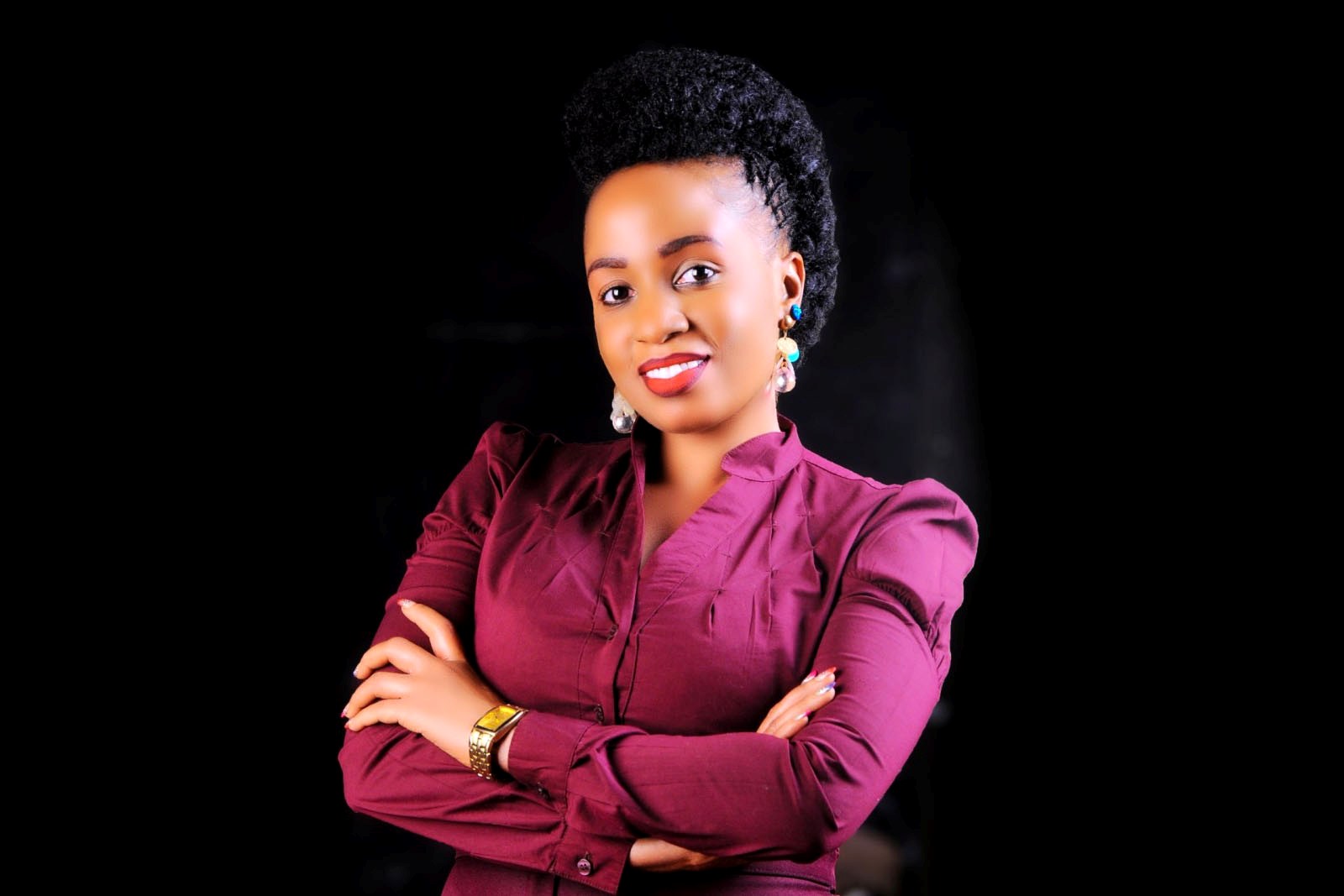
By Harriet Adong
Makerere University faculty, students and administrative staff diversely engaged at the Appropriate Technologies Expo. One of the over 850 multidisciplinary projects funded by the Government of the Republic of Uganda through Makerere University’s Research and Innovations Fund (Mak-RIF) https://rif.mak.ac.ug/ emerged ‘BEST INNOVATION’ (out of 46 showcased innovative solutions) at the Expo. This was Uganda’s Ministry of Water and Environment – Appropriate Technology Centre (ATC) 2023 Expo organized in partnership with Makerere University and United Nations Children’s Fund (UNICEF). It was the second Expo held at Kololo Ceremonial Grounds; Thursday February 2nd through Saturday February 4th, 2023 guided by the Theme: “Showcasing Appropriate Technologies that can be adopted to improve health, hygiene, social wellbeing, agriculture and environmental conservation”. Seven projects funded by the Government of the Republic of Uganda through Mak-RIF participated in this Expo.
The Winner and Best Innovation at the Expo is Makerere University’s project titled: Valorization of Waste Chicken Feathers for Water Purification: Designing and Constructing Low-Cost Keratin Based Nanofilters as Adsorbents of Heavy Metals and Nanosized Contaminants (MAK-RIF/CH/02/21). This project is being incubated at Makerere University College of Natural Sciences (CoNAS) under the leadership of Dr. Alice Nabatanzi, the Principal Investigator.
“This is very exciting news, it is evident that innovations start small, just think without the box, explore and leverage readily available resources and put these into use to propose solutions to address community challenges. Thank you so much Government of Uganda for the funding. Thank your Makerere University management for the enabling environment and thank you team at Mak-RIF for the opportunities for us to showcase our solutions. We pledge our best”, said Dr. Nabatanzi. She added that the efforts at hand currently are geared towards scaling the project for wider reach and in saying this she called upon potential partners, donors including the government of Uganda to embrace further supporting such innovative solutions to scale. Other team members include; Mr. Stanley Ofwono, Project Technician and Ms. Irene Achede, Project Administrator. Like other supported project teams, this team is engaging external stakeholders; Mr. Samson Okwir from Ugachick Poultry Breeders Ltd supports project implementation. In addition, mentorship of students is key at a higher learning institution like Makerere University and for this reason Mr. Thomas Wanyama and Tropher Ssali; Bachelor of Science Biotechnology students at CoNAS are team members of this project and they greatly supported at the Expo.
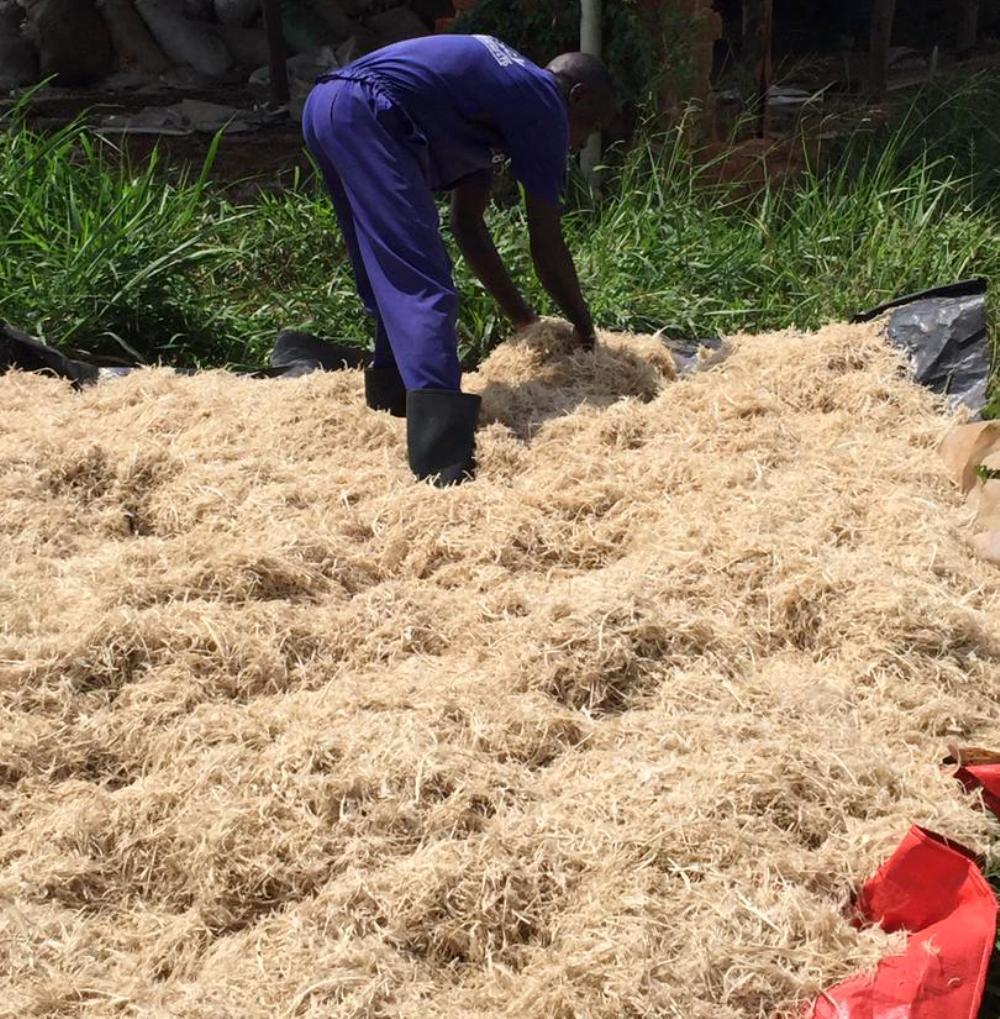
This project developed a keratin-based nanofilter using waste chicken feathers. This is a new technology and one of its kind in Uganda and Africa at large. The project aimed at efficiency and sustainability while promoting a circular economy. The developed filter is able to clean and purify water through removal of micro-organisms, heavy metals and other nano contaminants. The filtered water is safe and ready for use and even drinking. This project purposes to control environmental pollution through recycling of waste chicken feathers as it contributes to improved health, food safety, food security and environmental safety. This project majorly contributes towards SDGs 3, 6, 9, 13.
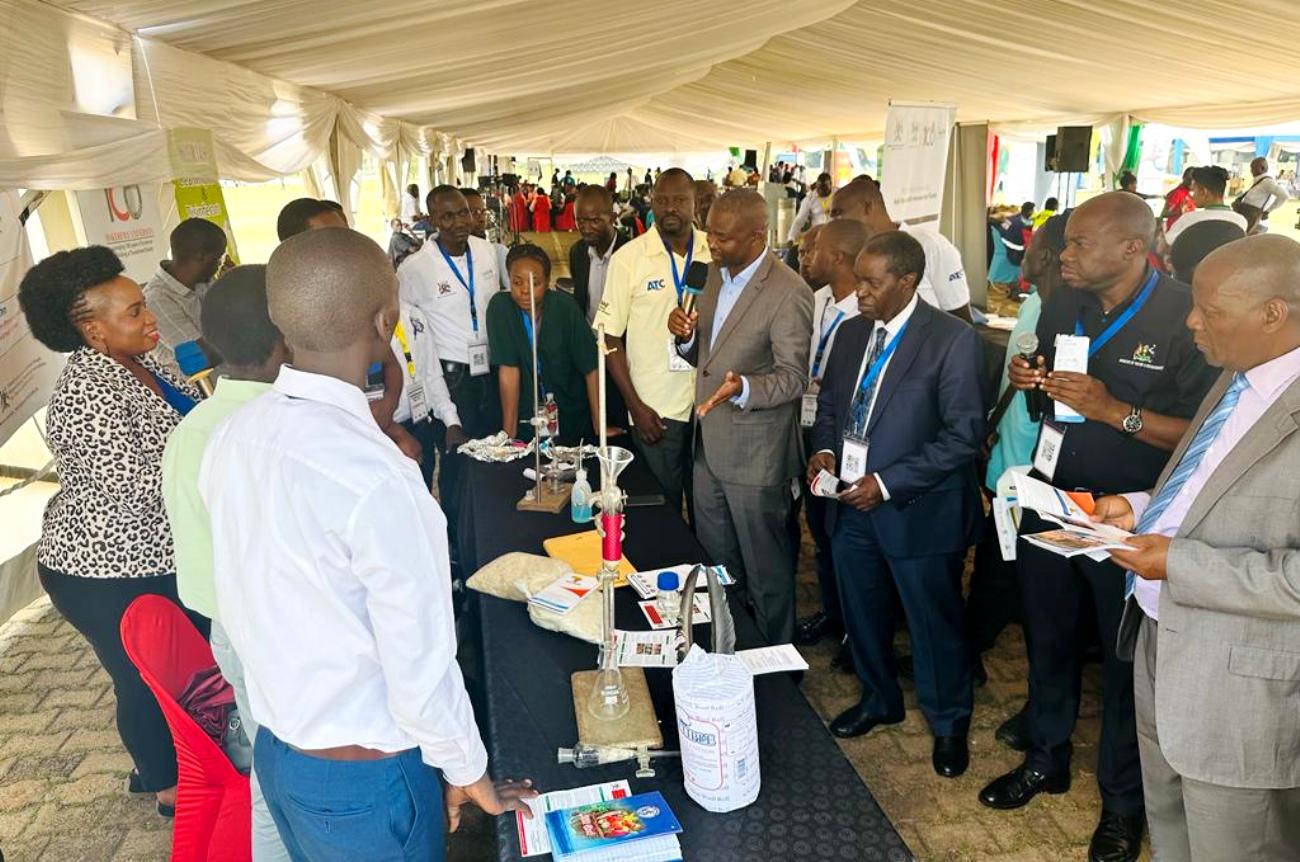
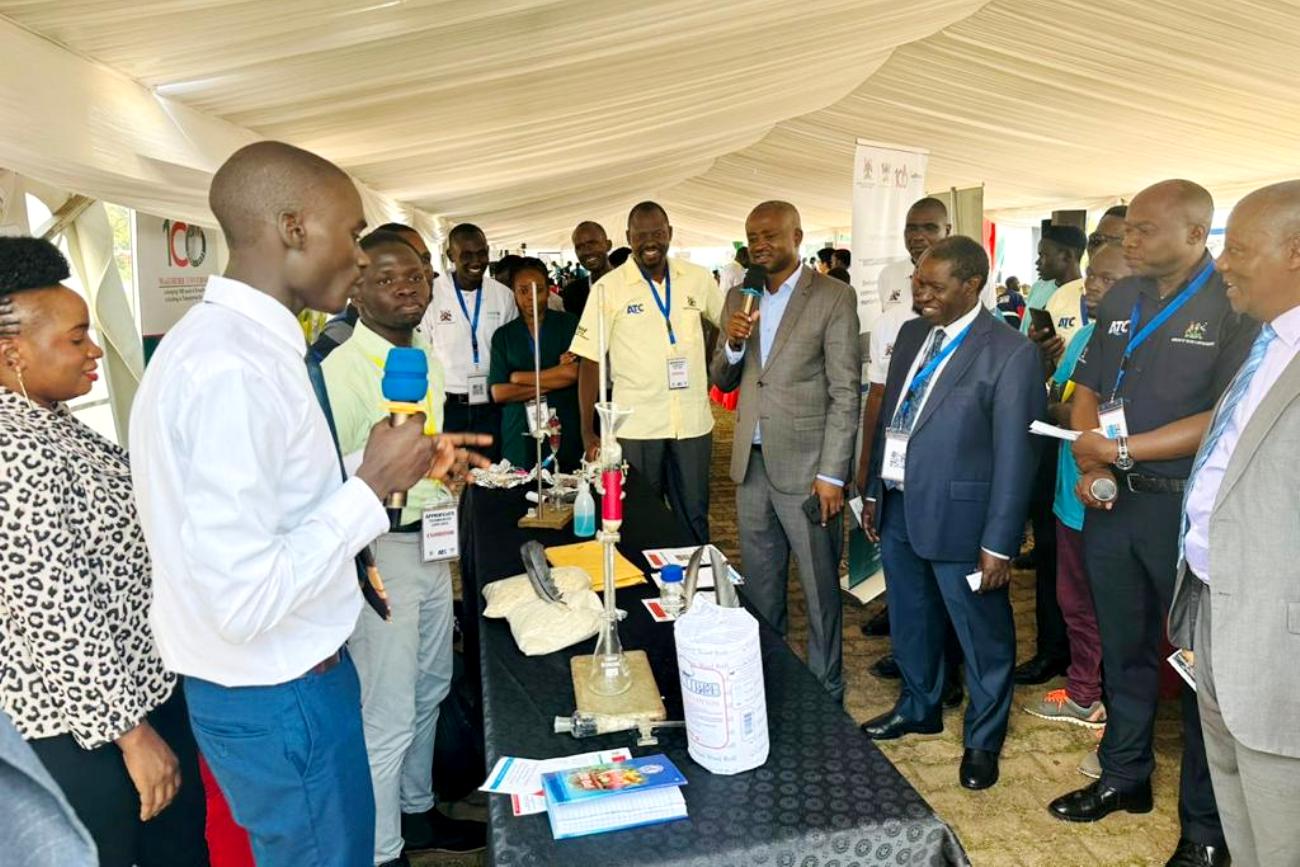
The second-best Innovation was the Trenching Machine that eases excavation of trenches during laying of water pipes and the third was an application used in the operation and maintenance of a water supply system both by teams from Busitema University. Congratulations!
Other Mak-RIF projects showcased at the Expo include the following;
- Green synthesis of graphene from Agro waste for energy storage devices – Dr. Nobert Mukasa – College of Engineering Design Art and Technology (CEDAT).
- Towards a Food Secure Uganda Under a Changing Climate – Dr. Isaac Mugume, College of Agricultural and Environmental Sciences (CAES).
- Environ e-Watch App for increased community surveillance in environmental monitoring catchment degradation and restoration – Dr. Patrick Musinguzi, College of Agricultural and Environmental Sciences (CAES).
- Functionalized XEROGEL – Carbon Water Filters – Dr. Ibrahim Karume, College of Natural Sciences (CoNAS).
- E-Participatory Innovation Platforms for Improved Access to Forestry Extension Services – Associate Prof. Justine Namaalwa, College of Agricultural and Environmental Sciences (CAES).
- Green Low-Cost Touchless Handwashing Technology (TW-20 Kit) For Public Shared Spaces, Dr. Dr. Joshua Wanyama,College of Agricultural and Environmental Sciences (CAES). Details about the launch of these kits are shared on https://rif.mak.ac.ug/mak-unveils-a-touchless-handwashing-kit-for-public-shared-spaces-in-response-to-covid-19-pandemic/
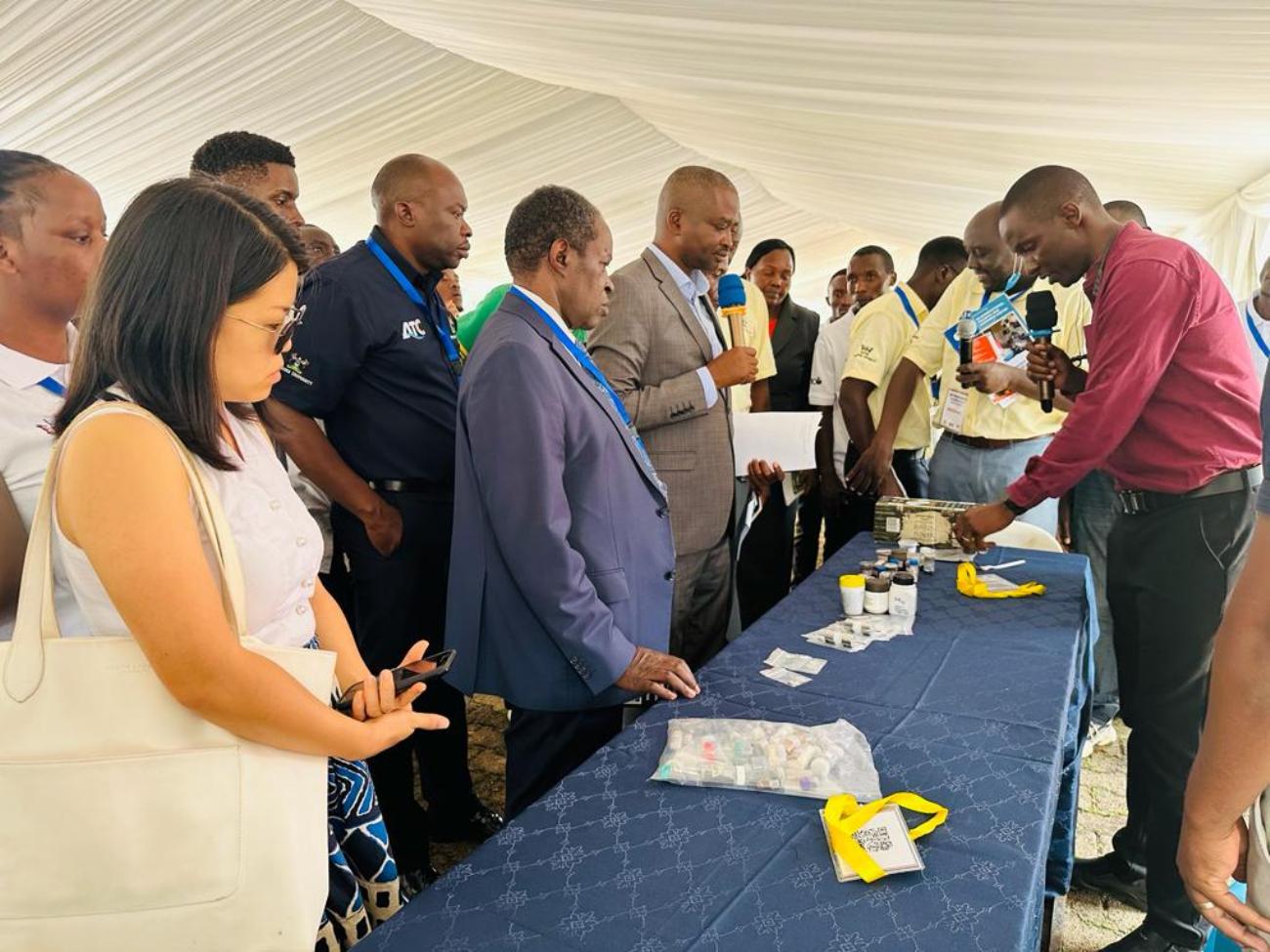
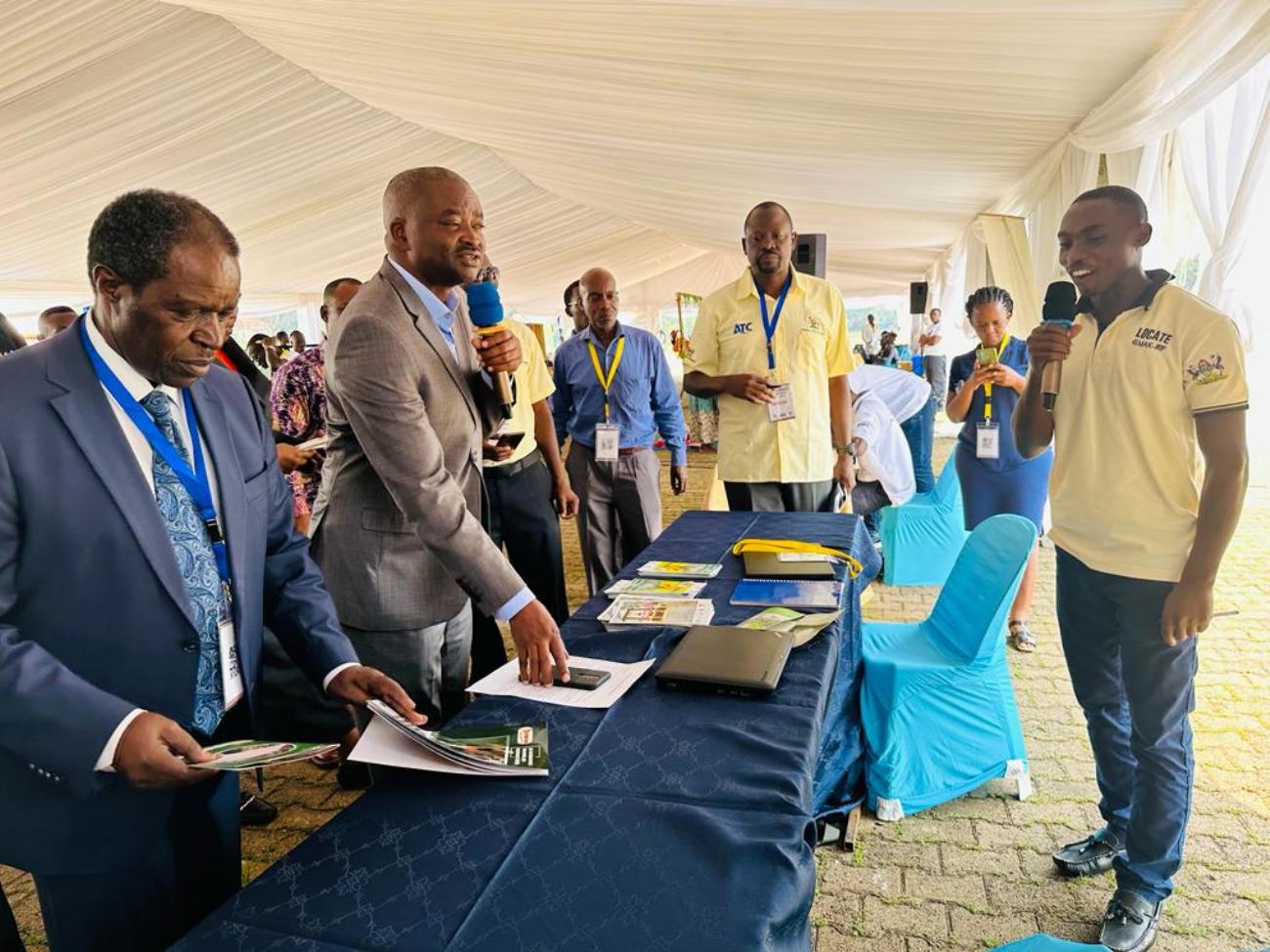
Upon receipt of this exciting news, Prof. Fred Masagazi-Masaazi, the Mak-RIF Chairperson Mak-said “Wow, Congratulations to all exhibitors at the just concluded ATC 2023 Expo and specifically to Makerere University’s Dr. Nabatanzi and your project team. I am happy that the adjudicators at the Expo identified this project and recognized it as the ‘BEST INNOVATION’. Indeed, we have many more potentially transformative projects being supported under the Mak-RIF initiative with funding from the Government of the republic of Uganda”. “We are forever grateful to the Government of Uganda for supporting research and innovations at Makerere University. This fund has continued to have spillover effects to other institutions of learning and organizations with whom our researchers and innovators have continued to work” Prof. Masagazi added.
The Appropriate Technologies 2023 Expo was an opportunity for Ministry of Water andEnvironment inpartnership with Makerere University and United Nations Children’s Fund (UNICEF) to showcase 47 innovative solutions directed towards positively impacting communities in which we live and serve. It was also at this Expo where the general public received various health services including HIV and Aids Counseling and Testing, Vaccination,testing for lifestyle diseases and Safe Male Circumcision etc. from Makerere University Hospital team. The Expo was attended by Members of Parliament, government officials including commissioners and assistant commissioners, private sector, researchers, innovators, entrepreneurs, the Media, Higher Education Institution faculty and students among others. Details about the Appropriate Technology Centre (ATC) are shared on https://atc.mwe.go.ug/
Engineer Christopher Tumusiime, Commissioner of the Water Utility Regulation Department at Uganda’s Ministry of Water and Environment welcomed all participants to the Expo noting that the Expo was an opportunity to showcase water supply, sanitation and environmentally appropriate technologies to spur social economic development in Uganda. “We are using this Expo to show that science and technology can be used to adjust effects of climate change, improve access to safe water, improve data management among others”, Engineer Tumusiime added. He thanked Makerere University Hospital team for providing health services during the Expo. He also thanked Prof. William Bazeyo, the ATC Chairperson for mobilizing Expo participants noting that he was also grateful to the Expo partners for all the support which enabled it to happen.
Mr. Yakubu Al Hassan Kassim, WASH Officer at UNICEF commended all stakeholders for a job well done at the Expo. He noted that the theme was well thought out especially in this error of socio-economic development efforts. “Let us give all these technologies support to scale. UNICEF focusses on sustainability of these technologies because this is authentic for home grown solutions. We are proud to be part of this and please, whenever there is an opportunity, call on us” he added.
Prof. William Bazeyo, the Appropriate Technology Centre Chairperson called upon all stakeholders to support Uganda’s innovations to get into the different markets. He said “Our people in the communities deserve even more especially using some of the simple technologies for example purification of water”. Prof. Bazeyo thanked Hon. Aogon for sparing time to engage with each exhibitor while offering guidance. He requested Hon. Aogon to please take the message to the committee he is leading that what they are looking for is all at the ATC Expo. “One day, Uganda will be a source of what the region requires for example employment of the youth” he added. He also thanked Makerere University and UNICEF for the partnership noting that he is always proud to be part of Makerere University and would continue working with the teams to spur research and innovation.
Honorable Silas Aogon, Uganda’s Member of Parliament for Kumi Municipality, Kumi District and Chairperson Uganda Parliamentary Forum on Water Sanitation and Hygiene (WASH) graced the expo as Chief Guest. He commended Ugandans who are researching and innovating including those embracing research and innovation. He called upon all to make technology and its aspiration viral. “Let new circles influence upcoming circles to grow technology” he noted. “We need appropriate technologies to save our natural bodies, control pollution, and reduce carbon emission” Hon. Aogon added. He also said that appropriate technologies need to trickle down to the last mile communities and thus the need to continue supporting the growth and development of technology. “On behalf of Government of Uganda, we pledge to continue supporting technology growth in Uganda and beyond. Let us all accord technology and innovation a priority so that we all benefit in one way or another” he said. He applauded the two Professors; Prof. William Bazeyo, the ATC Chairperson and Prof. Sylvia Nannyonga Tamusuza, Chairperson Makerere University Grants Administration and Management Unit and Head of Department Makerere University Department of Performing Arts and Film who joined in the Expo. He also appreciated the Makerere University Department of Performing Arts and Film for entertaining the Expo participants noting that when people sing properly then one is able to even work properly. He concluded by noting that by the time someone carries out research by him or herself, then that is a calling from God and may God continue to bless all researchers and innovators.
This Expo was also livestreamed online
Day 1 of the Expo – Follow the engagement on https://www.youtube.com/live/LI2z4hKCWvA?feature=share
Day 2 – https://www.youtube.com/live/qL8OcMJ0OvQ?feature=share
Day 3 – https://www.youtube.com/live/NjrK2s3FQak?feature=share
Harriet Adong is the Communications Officer, Makerere University Research and Innovations Fund (Mak-RIF)
Contributor: Dr. Alice Nabatanzi, Project Principal Investigator
You may like
-


Over 9,200 to graduate at Makerere University’s 76th Graduation
-


76th Graduation Highlights
-


Mak Selected to Host Alliance for African Partnership Africa Office
-


Strengthening Global Partnerships to Advance Research, Innovation, and Graduate Training: Makerere University Hosts Delegation from the University of Warwick
-


Uganda has until 2030 to end Open Defecation as Ntaro’s PhD Examines Kabale’s Progress
-
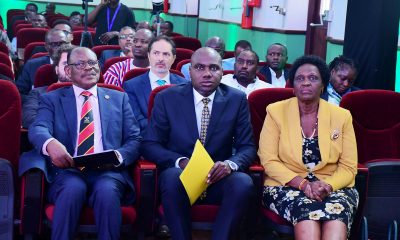

First African Symposium underscores the role of the Centre of Excellence for Africa Climate-Sensitive Macroeconomic Modelling
Natural Sciences
BOKU University Charts New Collaboration Strategies with Mak’s Department of Zoology, Entomology & Fisheries Sciences
Published
2 weeks agoon
February 12, 2026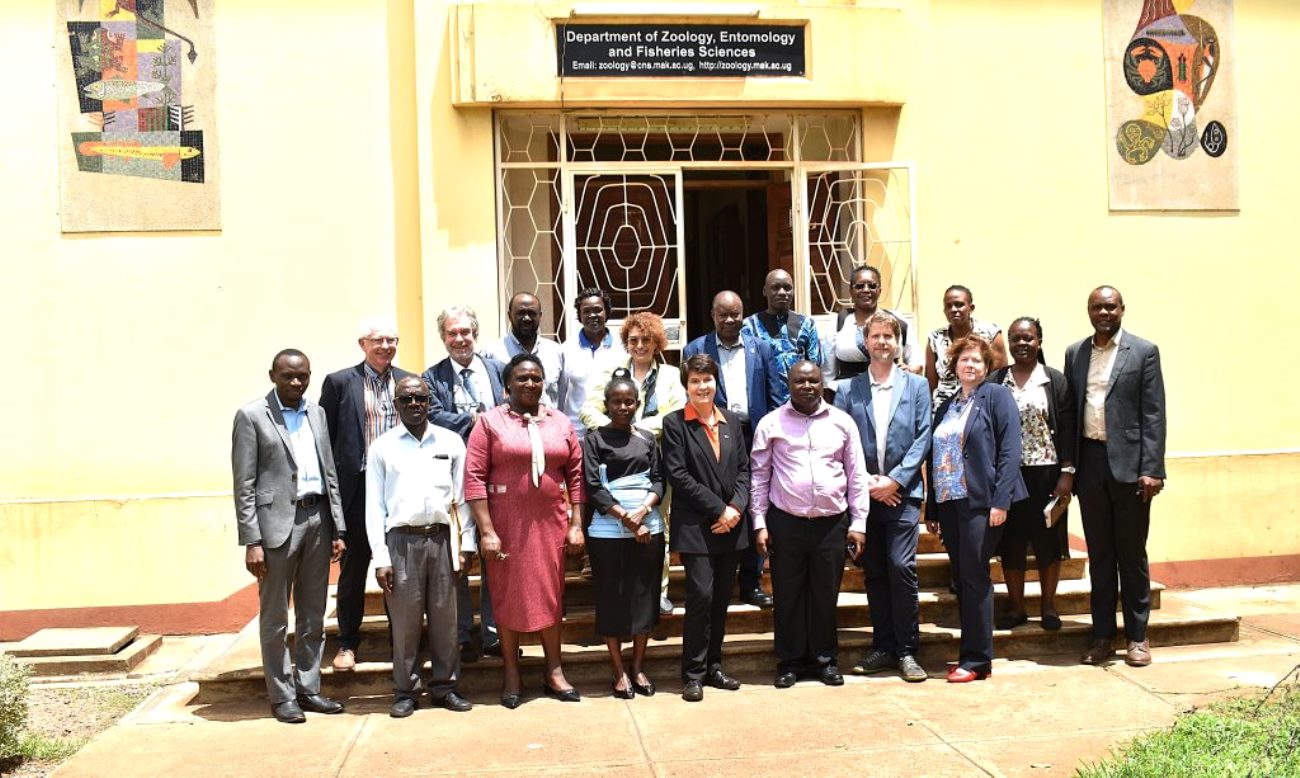
The Department of Zoology, Entomology and Fisheries Sciences at Makerere University on 11th February 2026 hosted a high-level delegation from the University of Natural Resources and Life Sciences, Vienna (BOKU), to discuss strategies for future collaboration in a partnership that has spanned five decades.
The meeting followed the BOKU team’s participation in the opening ceremony of the Promotion of Hybrid Renewable Energy Systems towards Electricity Access in Uganda project, an initiative designed to expand access to decentralized renewable energy solutions. The project, implemented under CEDAT, is funded by the Austrian Partnership Programme in Higher Education and Research for Development (APPEAR), a programme of the Austrian Development Cooperation administered by OeAD.
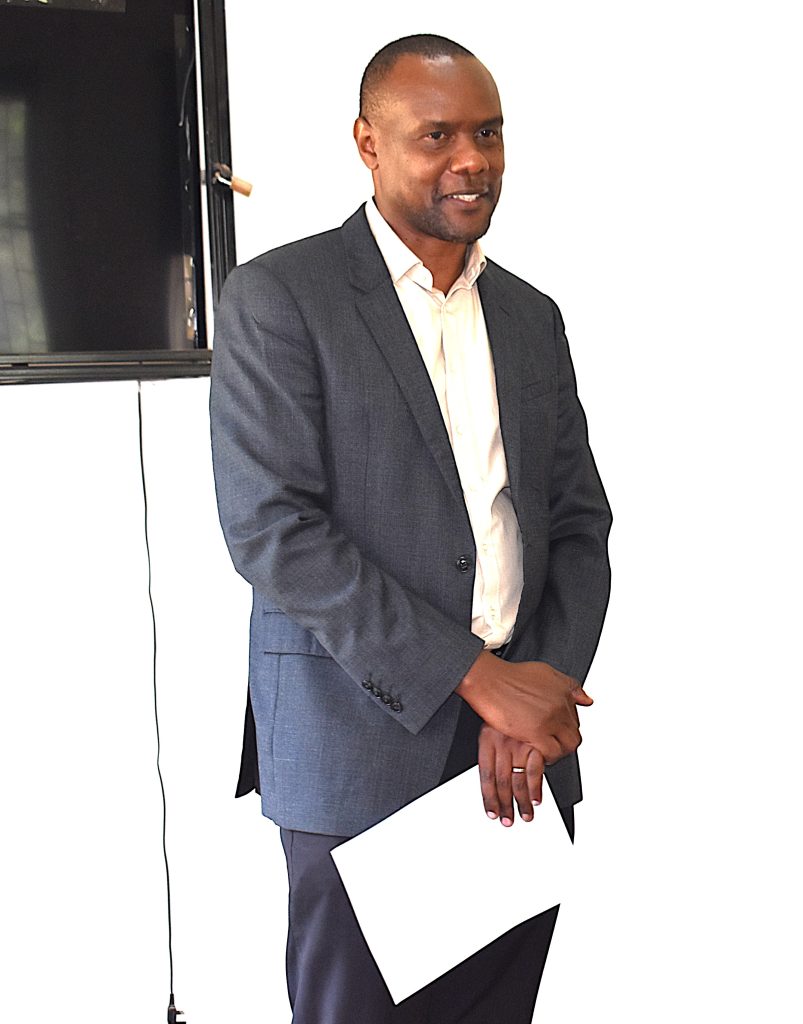
Discussions at the Department of Zoology, Entomology and Fisheries Sciences focused on deepening and broadening a historic collaboration that has shaped aquatic sciences, fisheries research, and environmental management in East Africa for half a century.
A Partnership Rooted in Limnology
The collaboration between Makerere University and BOKU traces its origins to 1975 with the establishment of the International Post-Graduate Course in Limnology (IPGL) by the late Heinz Löffler (1927-2006). The eight-month UNESCO-supported course, hosted in Lunz, Mondsee and Vienna, was designed to train scientists from developing countries in limnology – the study of inland waters.
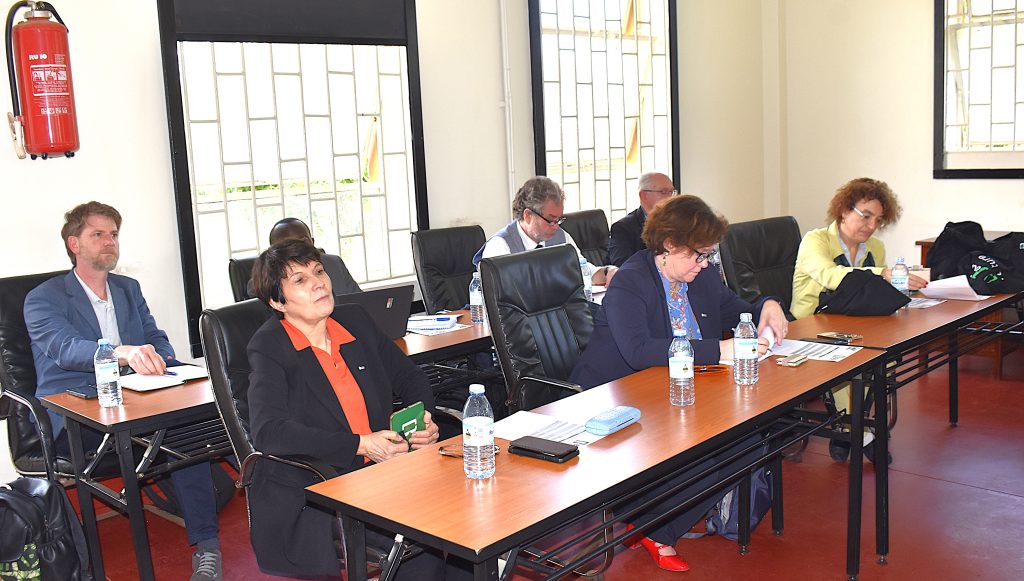
In 1976, Dr. Gwahaba James Joshua of Makerere’s Department of Zoology, Entomology and Fisheries Sciences became the first beneficiary from the university. Two years later, Boniface Makanga attended the UNESCO course and went on to initiate a Marine Practical Course to the Indian Ocean in 1993. That programme has since grown into over 30 years of annual field activity in Mombasa, benefiting undergraduate and master’s students and strengthening hands-on marine science training at Makerere.
Over time, IPGL evolved into a vibrant International Joint Degree Master’s Programme in Limnology and Wetland Management. The programme has built capacity for 123 aquatic professionals – 56 female and 67 male, including 20 from Makerere University. Notably, 11 dedicated limnologists are currently based within the Department of Zoology, Entomology and Fisheries Sciences, a testament to sustained capacity development.
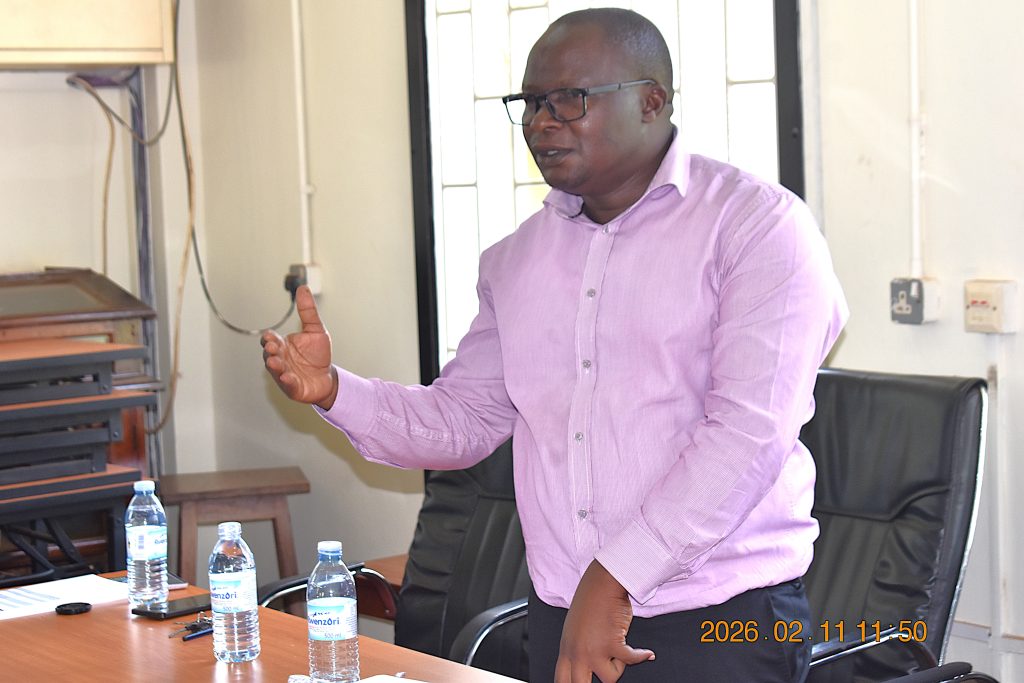
Expanding into Fisheries, Aquaculture and Regional Networks
The Mak-BOKU collaboration progressively expanded beyond limnology into fisheries, aquaculture, and broader freshwater ecosystem management.
Among the key initiatives was STRECAFISH (2015-2018), which focused on strengthening regional capacity in fisheries and aquaculture research and training to improve food security and livelihoods in Eastern Africa. The programme adopted a modular approach, trained 28 MSc students, supported five full PhDs and 11 MSc research projects, and facilitated 14 staff exchanges.
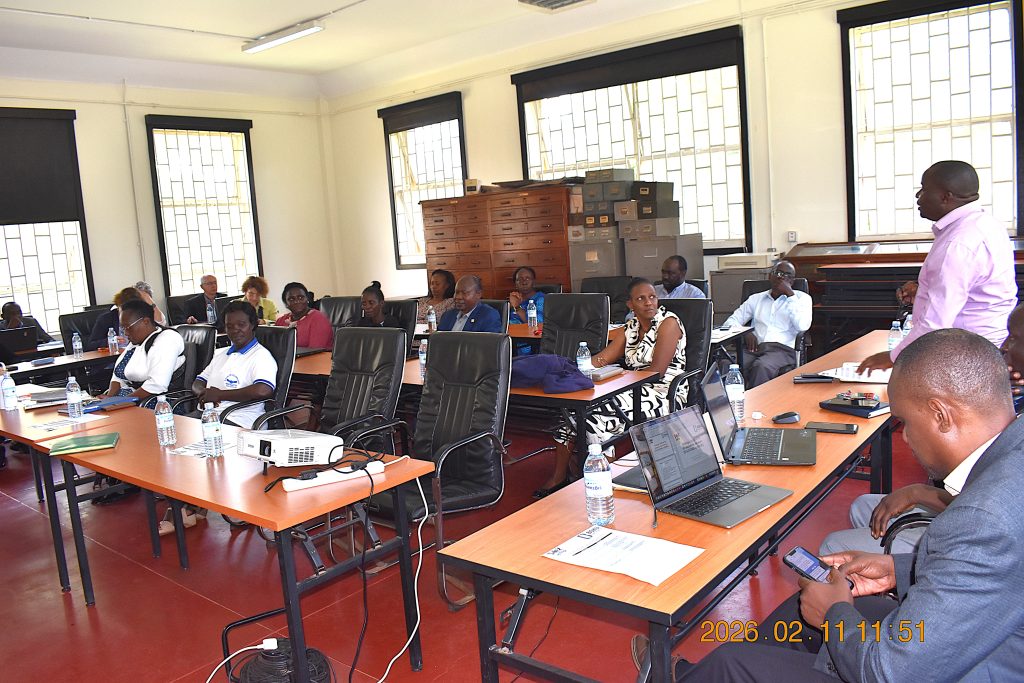
This momentum continued under COTRA (Collaborative Training in Fisheries and Aquaculture in East, Central and Southern Africa) from 2017 to 2023. COTRA enhanced staff and student mobility, supporting 24 master’s students (six credit-seeking and 18 degree-seeking), 12 doctoral candidates (four credit-seeking and eight degree-seeking), and 10 faculty and administrative staff. The initiative emphasized fit-for-purpose PhD training in aquaculture and fisheries to address food security challenges in Sub-Saharan Africa under the ACP-EU Cooperation Programme in Higher Education (EDULINK II), in partnership with institutions such as Lilongwe University of Agriculture and Natural Resources.
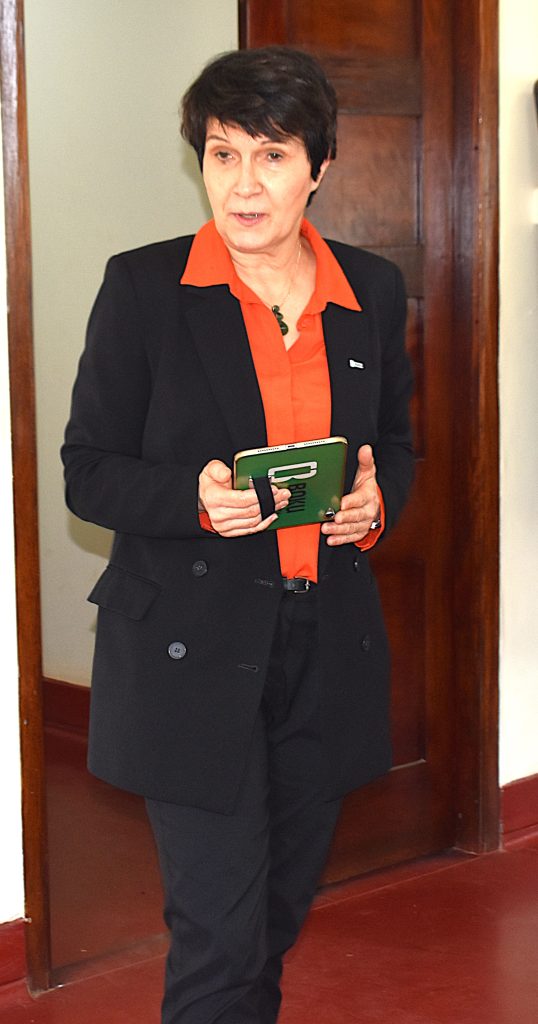
Ongoing collaborations include the Erasmus+ KA1 Learning Mobility of Individuals programme (2021-2027), which connects BOKU and Makerere with Egerton University, Kyambogo University, Addis Ababa University, Bahir Dar University and others. Additional joint initiatives include:
FreshNet: A higher education and research network for sustainable management of freshwater ecosystems in Eastern Africa, involving BOKU, Egerton University, Addis Ababa University, Bahir Dar University, EIAR and IHE Delft.
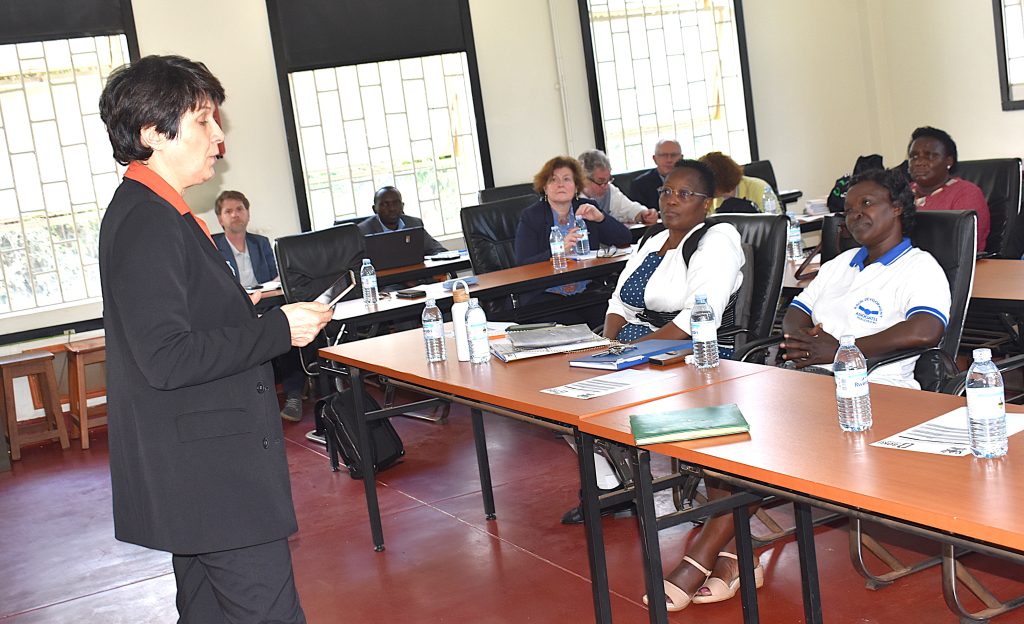
SWAQ-Uganda (2021-2026): Sustainable water quality management supporting Uganda’s development ambitions, implemented with IIASA, BOKU and Uganda’s Ministry of Water and Environment.
BIOGOLD (2024–2027): A project on biosorption for sustainable small-scale gold mining in Uganda, involving Kyambogo University, Makerere University, Gulu University, the University for Continuing Education and the University of Pretoria.
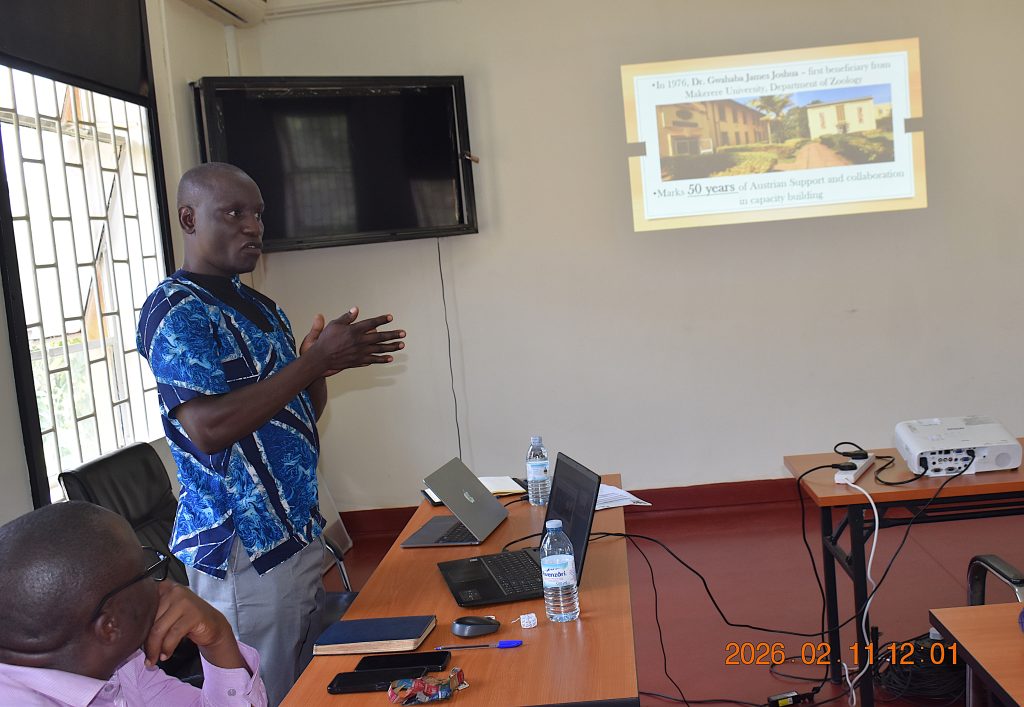
Collectively, these initiatives underscore a 50-year-old partnership that has built critical human resources at MSc and PhD levels in aquatic ecosystem management, conservation and utilization. The collaboration has also facilitated acquisition of essential research equipment, strengthened administrative capacity in project management, and nurtured a culture of knowledge sharing and innovation.
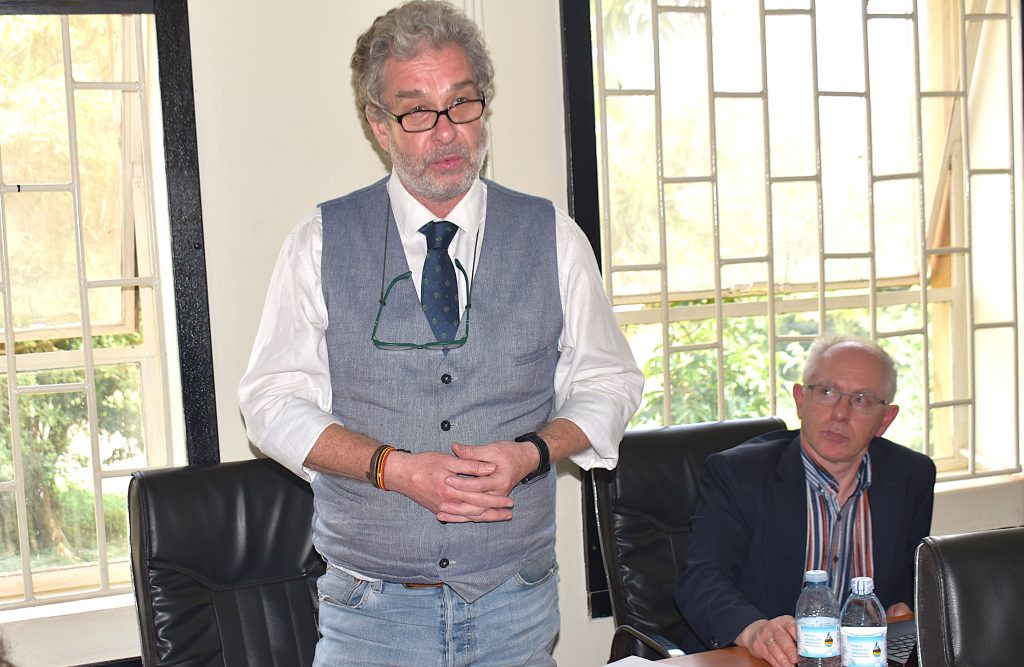
Meeting with the BOKU delegation
The BOKU delegation was led by the Rector, Prof. Eva Schulev-Steindl, a specialist in environmental law, and Vice Rector Assoc. Prof. Doris Damyanovic, an expert in landscape planning. They were accompanied by:
- Mag. Gerold Winkler, Coordinator of the Applied Limnology / Limnology and Wetland Master’s programme;
- Dr. Mathew Herrnegger, BOKU’s Africa Cooperation Country Coordinator and hydrology specialist; and
- Dr. Andreas Melcher, Africa-Uninet Coordinator from BOKU’s Institute for Development Research.
During the discussions with departmental staff, Dr. Akoll presented a detailed account of the partnership’s evolution and achievements, emphasizing its transformative impact on regional training and research capacity.
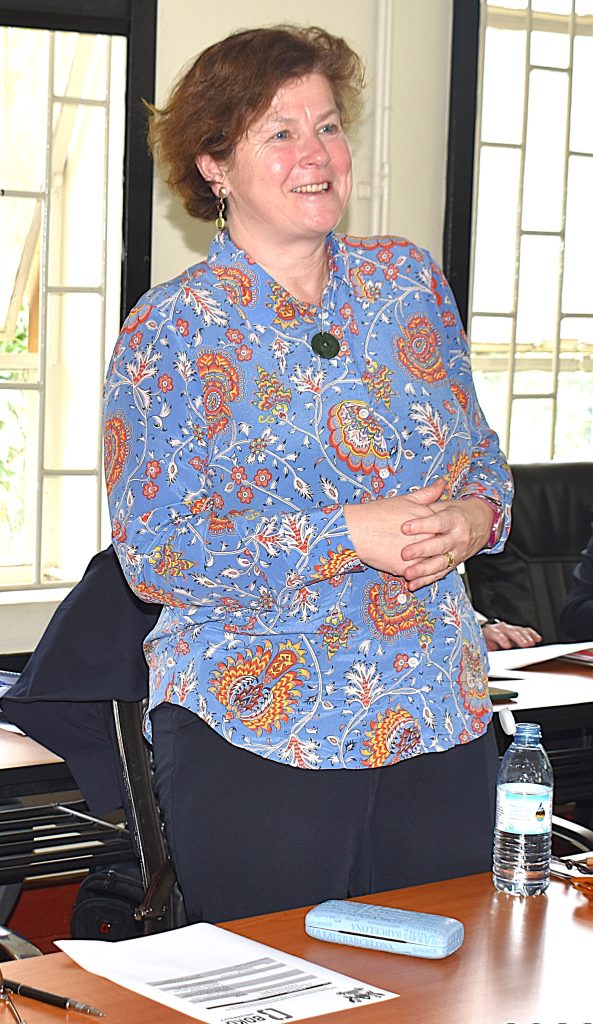
Charting the Next Chapter
As the partnership enters its sixth decade, both institutions are keen to expand into new frontiers. Key areas identified for future collaboration include:
- Enhanced staff and student exchanges;
- Joint research projects and co-publications;
- Introduction of short courses at the Makerere University Biological Field Station, Kibale beyond wildlife studies;
- Research on climate change and its effects on marine and freshwater resources;
- Advancement of basic biological research; and
- Strengthening fisheries research and innovation.
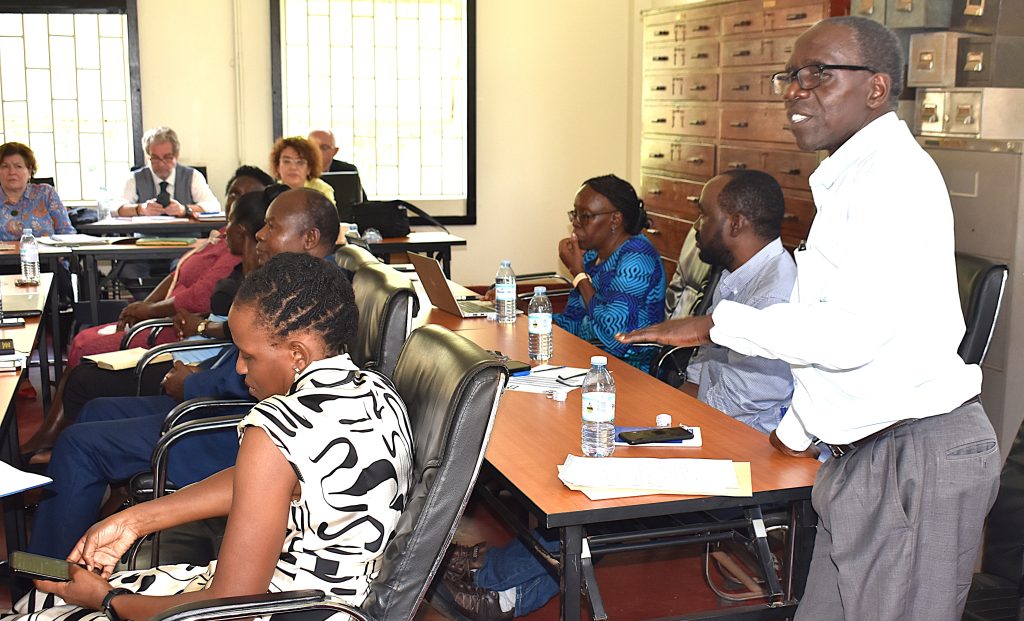
In his remarks, the Head of the Department of Zoology, Entomology and Fisheries Sciences, Dr. Godfrey Kawooya expressed gratitude for the enduring partnership, noting that it has significantly strengthened regional training capacity and supported the education of numerous Makerere staff and students. He added that the collaboration reinforces Makerere’s standing as one of the most collaborative universities globally and aligns closely with its research agenda.
Rector Schulev-Steindl reaffirmed BOKU’s commitment to advancing the longstanding relationship, describing it as a model of North-South academic cooperation built on mutual respect, shared knowledge and tangible impact.
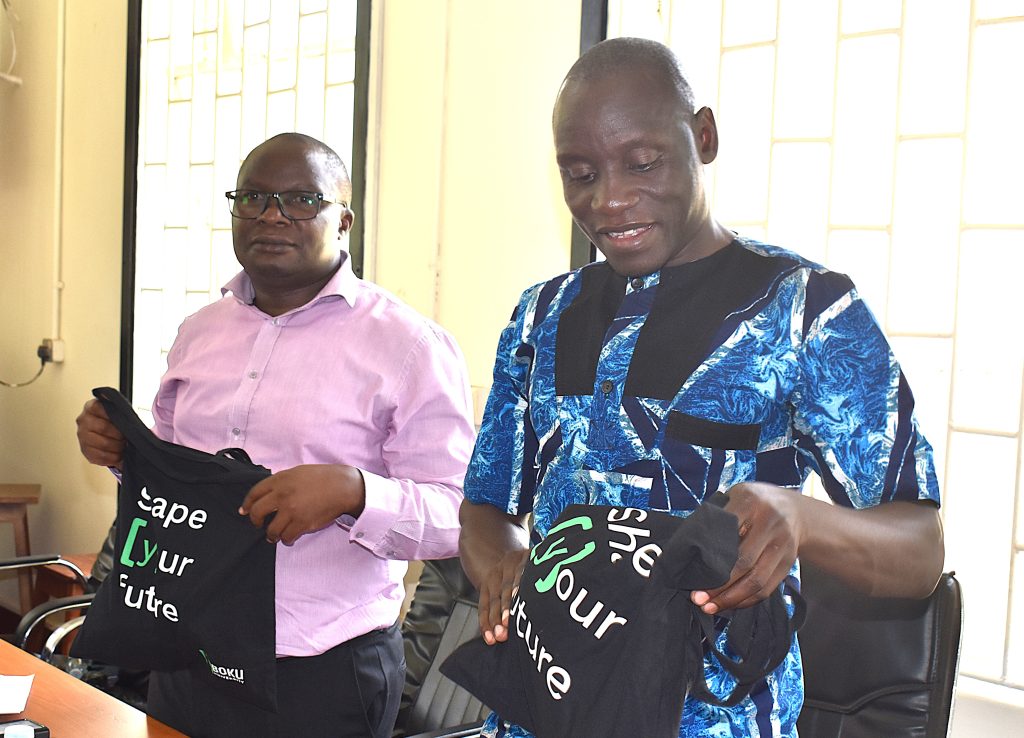
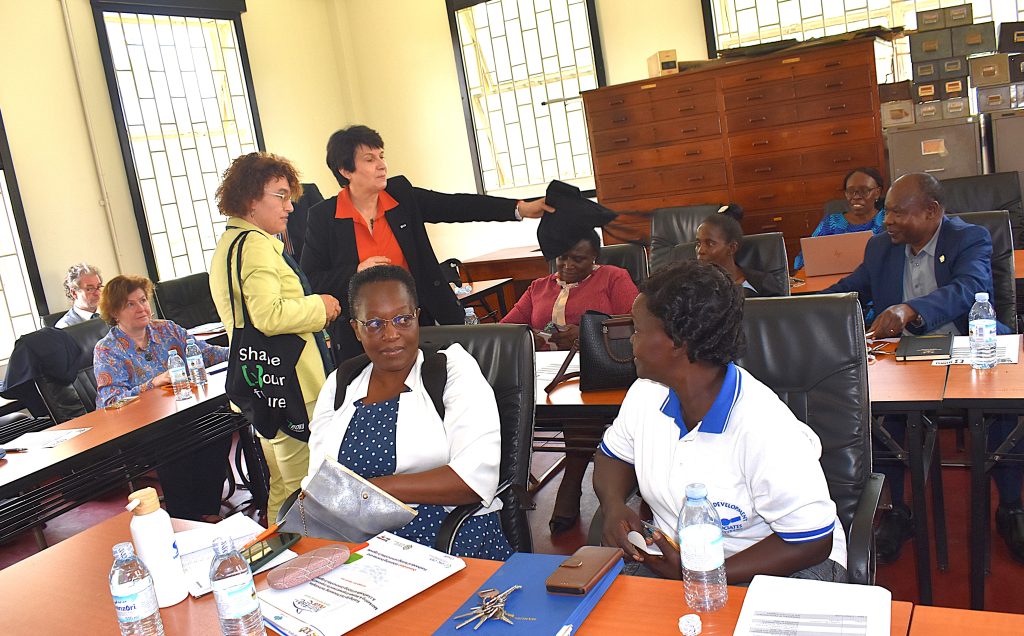
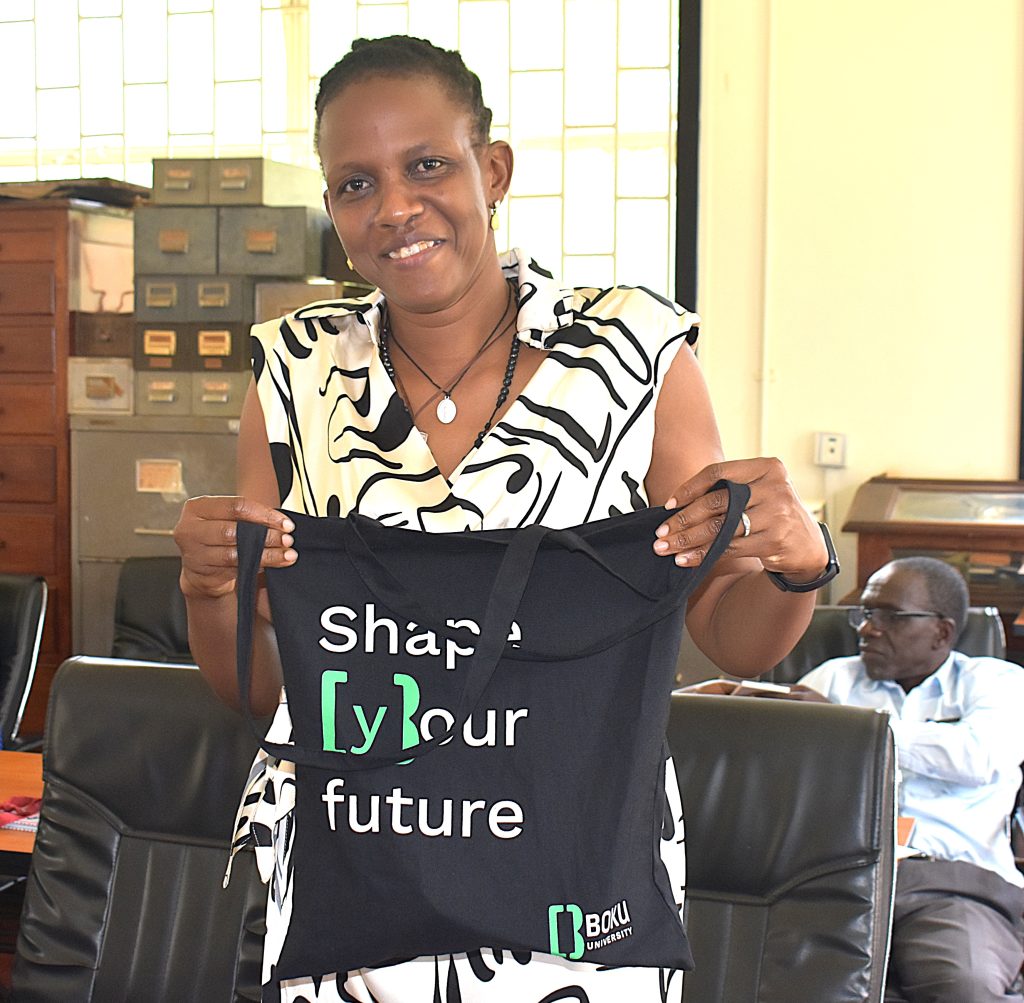
Event pictorial: https://drive.google.com/drive/folders/1HkCCZf_TCPV0V7_ZR2PSVEw1zrEGhZeJ?usp=sharing
Natural Sciences
Simon Mungudit: Mak’s Best Performing Male Science Student & Rising Star in Petroleum Geoscience
Published
3 weeks agoon
February 3, 2026
At just 24 years old, Simon Mungudit from the College of Natural Sciences (CoNAS) has etched his name in the academic history of Makerere University, having emerged as the overall best male student in the Sciences, an achievement earned through perseverance, discipline, and an unrelenting pursuit of excellence.
Mungudit is set to graduate during 76th graduation ceremony scheduled for 24th to 27th February 2026, having attained a CGPA of 4.76 in the Bachelor of Science in Petroleum Geoscience and Production. His academic interests-Reservoir Engineering, Petrophysics, and Drilling-reflect a deep understanding of the subsurface sciences that power modern energy systems.
Early Life and Journey to Academic Excellence
Born to Mr. Owor Thomas, a Game Ranger with the Uganda Wildlife Authority at Murchison Falls National Park, and Ms. Lilly Obewun Grace of Akuru Bridge Village, Nyaravur Sub-County in Nebbi District, Mungudit’s journey to academic excellence began far from the lecture halls of Makerere. At Karuma Primary School, Mungudit scored 12 aggregates in the Primary Leaving Examinations (PLE), setting the pace for his future success. He proceeded to St. Daniel Comboni College, Nebbi, where he attained 14 aggregates in 8 subjects at O’ Level. He then joined Namilyango College, one of the best secondary schools in Uganda, where he studied Physics, Chemistry, and Mathematics (PCM) and scored 19 points, results that secured him government sponsorship to pursue a Bachelor of Science in Petroleum Geoscience and Production at Makerere University.
Gratitude to his mentors and sponsors
Behind these milestones lies a story of humility, gratitude and opportunity. Mungudit credits his parents for supporting his primary and O’ Level education and expresses gratitude to TotalEnergies, which provided a full bursary for his A’ Level studies, covering tuition, upkeep, and medical care. He also acknowledges the Government of Uganda for sponsoring his university education, a factor he says motivated him to excel.
At Makerere, Mungudit thrived in an environment that blended rigorous academics with mentorship. He pays tribute to his lecturers, particularly Dr. Arthur Batte, Head, Department of Geology and Petroleum Studies, for their unwavering commitment to nurturing students and pushing them to excel.
“I always aimed to excel,” Mungudit says. “Together with a few colleagues, we formed a group and held discussions on a daily. This, coupled with a conducive study environment, prayer, and discipline, enabled us to attain excellent grades.”
Dr Arthur Batte describes Mungidit as a humble yet very intelligent student.
Achievements and Professional Experience
Beyond academics, Mungudit consistently demonstrated expertise in petroleum engineering. In 2024, he led a team that won the Reservoir Modelling Challenge, organized by the American Association of Petroleum Geologists (AAPG) Makerere University Chapter, earning prize money and a sponsored field trip to the Tilenga Project courtesy of COSL. He was First Runner-Up in the Petro Bowl competitions of 2023 and 2025, a highly competitive petroleum knowledge quiz organized by the Society of Petroleum Engineers (SPE) Uganda Section. He served as a Student Officer for the SPE Makerere University Chapter in 2023, and in 2024, he chaired the Organizing Committee of the SPE Annual Students’ Technical Conference and Exhibition, helping bridge the gap between academia and industry.
His learning extended beyond the classroom. During his internship, he worked with TotalEnergies, where he applied petrophysics skills to analyze gas-while-drilling data for formation evaluation, hands-on exposure that sharpened his professional competence. At Makerere University, he mastered PetroMod 2018, a critical software tool in oil and gas exploration. After completing his studies in June 2025, Mungudit trained with the Uganda National Oil Company (UNOC), participating in the 2D seismic acquisition in the Kasurubani Block in Buliisa and Hoima districts.
Mungudit currently works as the Special Projects Coordinator for the Society of Petroleum Engineers (SPE) Uganda Section Student Liaison Committee.
Future Plans
Mungudit hopes to work in the oil and gas industry in the upstream sector as a geoscientist. He also plans to pursue further studies in petroleum engineering.
From a village in Nebbi to the forefront of petroleum geoscience, Mungudit’s story is one of an opportunity seized and potential realized. It is a testament to what is possible when talent meets support, and when determination is guided by faith, mentorship, and service. As Uganda’s oil and gas sector continues to evolve, Mungudit stands as a symbol of the skilled, principled professionals poised to shape its future.
The CoNAS fraternity congratulates Mungudit on this noble achievement.
Natural Sciences
Enhancing Data Quality: NutriFishPlus Research Assistants Retooled Ahead of Baseline Survey
Published
1 month agoon
January 20, 2026
The NutriFishPlus Project team successfully conducted a one-day capacity-building training for its research assistants, centered on the Monitoring, Evaluation, and Learning (MEL) framework and the household survey tool. Held on 13th January 2026 at Ridar Hotel Seeta in Mukono District, the training aimed to improve data collection, analysis, and learning processes to support evidence-based project implementation and impact assessment.
It was officially opened by Dr. Jackson Efitre, the Principal Investigator, who introduced the research assistants to the overall goal of the NutriFishPlus Project and the guiding principles of the International Development Research Centre (IDRC) Scaling Approach. In his remarks, Dr Efitre emphasized the importance of high-quality data in tracking progress, informing adaptive management, and scaling impact.
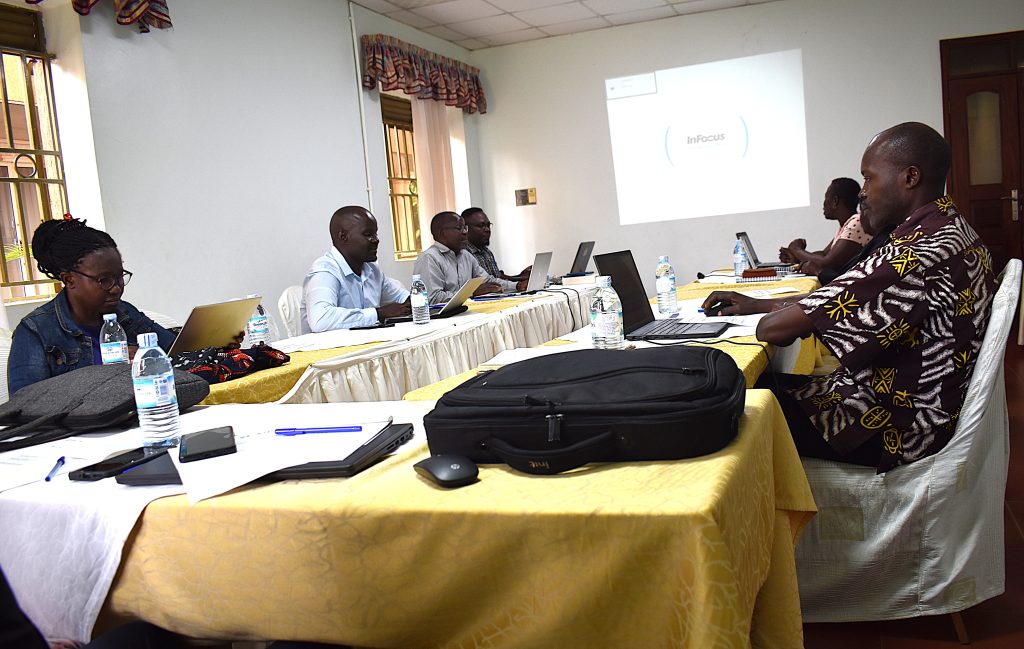
NutriFishPlus builds on the significant achievements of the ground-breaking NutriFish Project (2019–2023), which was funded by IDRC and the Australian Centre for International Agricultural Research (ACIAR) through the Cultivate Africa’s Future Fund Phase II (CultiAF2). Officially launched on 28th October 2025, the two-year and eight-month project seeks to scale proven innovations while deepening nutrition, livelihood, and gender outcomes within small pelagic fisheries.
The project aims to:
- Scale up the adoption of improved and sustainable fish processing technologies, including solar tent driers and raised racks, to reach new fishing communities across Uganda.
- Enhance market access and strengthen supply chain linkages for high-quality fish and fish-based products.
- Empower women and other vulnerable groups while strengthening community resilience through diversified income-generating activities.

Expected Outcomes:
NutriFishPlus is expected to deliver multiple socioeconomic and environmental benefits, including:
- Improved incomes and livelihoods for marginalized fishing communities, particularly women and youth.
- Enhanced health and nutrition outcomes through the development of diversified, market-embedded fish products.
- Establishment of sustainable and replicable fish processing and marketing models across Uganda and the wider East African region.
- Increased participation of women and youth in decision-making and benefit-sharing within the Small Pelagic Fishes (SPFs) value chain.
- Improved socioeconomic conditions and ecosystem health through participatory and scalable approaches.
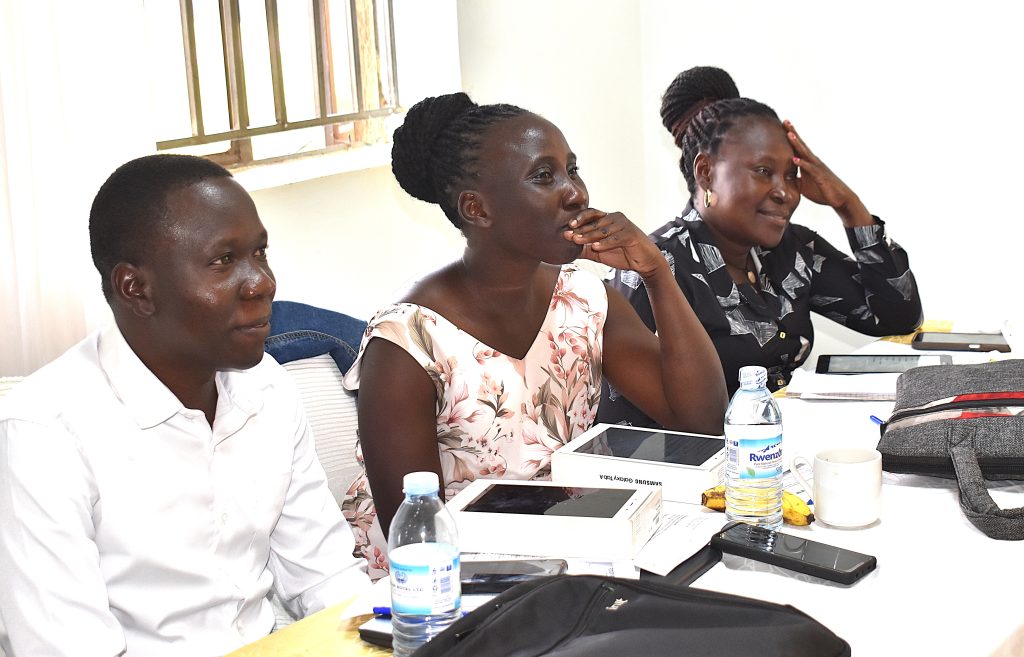
Project Implementation and Partnerships
The project is implemented by the Department of Zoology, Entomology, and Fisheries Sciences at Makerere University, in partnership with Nutreal Ltd and Kati Farms Ltd under a public-private partnership. Project activities will be carried out at five landing sites across Lakes Victoria, Kyoga, and Albert.

The project team comprises:
- Dr. Jackson Efitre (Principal Investigator)
- Dr. Dorothy Nakimbugwe (Co-PI from Nutreal Ltd)
- Ms. Lovin Kobusingye (Co-PI from Kati Farms Ltd)
- Dr. Robinson Odong (Project Officer, Department of Zoology, Entomology and Fisheries Sciences, Makerere University)
- Ms. Juliet Ogubi Nafula (M&E Expert)
- Ms. Nelly Badaru (Gender Specialist)
- Mr. Eugene Swinnerstone Miheso (IT Expert)
- Mr. Maurice Ssebisubi (Kati Farms Ltd)
- Ms. Hasifa Kabejja (Communication Officer)
- Ms. Eve Akongo Ampa (Project Administrator)
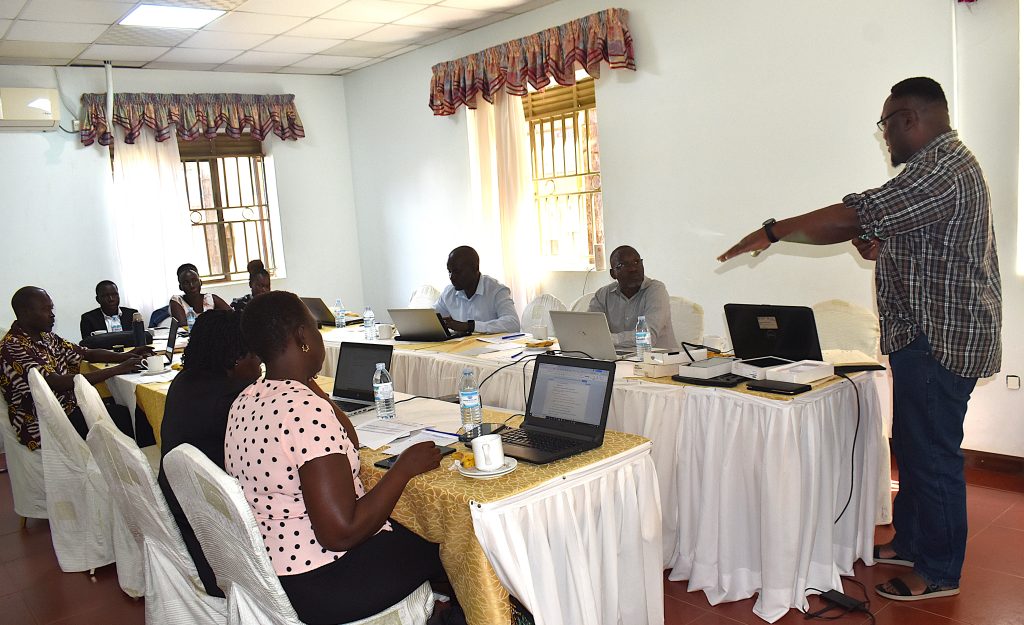
Strengthening MEL and Data Quality
During the training workshop, Ms. Juliet Ogubi Nafula guided the team through the NutriFishPlus MEL framework, highlighting its objectives, indicators, results chain, and reporting requirements. Particular emphasis was placed on the role of high-quality data in facilitating project learning, adaptive management, and accountability to donors and beneficiaries.
A key highlight of the training was a hands-on orientation to the household survey tool, led by Mr. Eugene Swinnerstone Miheso. Participants were taken through the structure of the questionnaire, which covers household demographics, nutrition and dietary diversity, fish consumption, livelihoods, value addition, gender dynamics, and food security. Practical sessions enabled the research assistants to practice administering the tool, apply effective probing techniques, and address common field-level challenges.
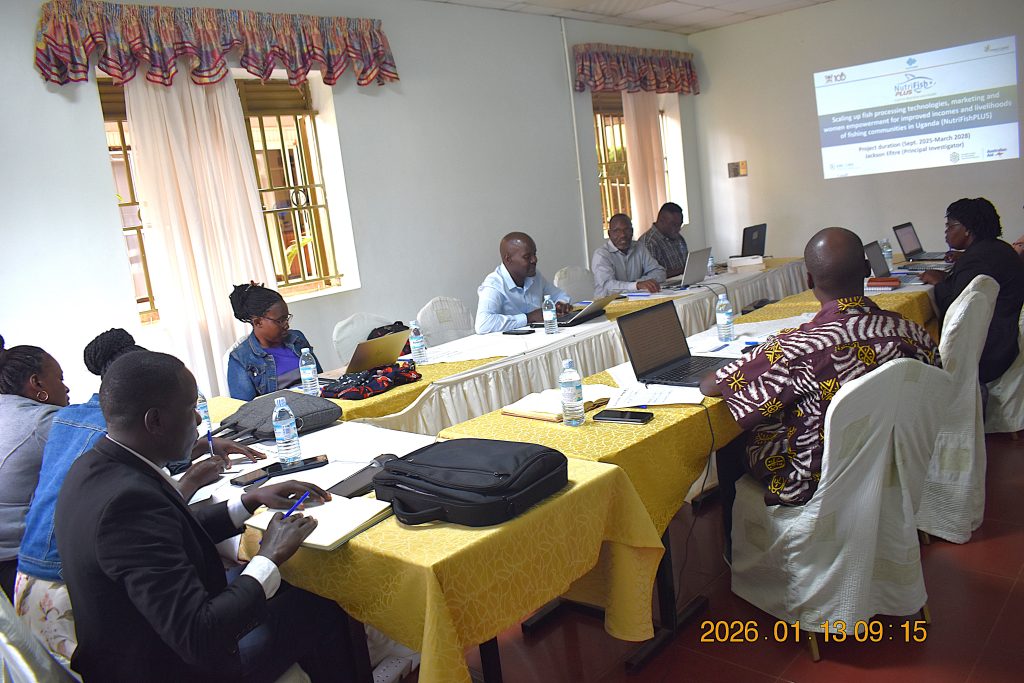
The training underscored critical ethical considerations in household data collection, including informed consent, confidentiality, and respectful engagement with respondents. Data quality assurance measures such as accurate data recording, use of digital data collection platforms, and daily review protocols were discussed to ensure consistency and reliability.
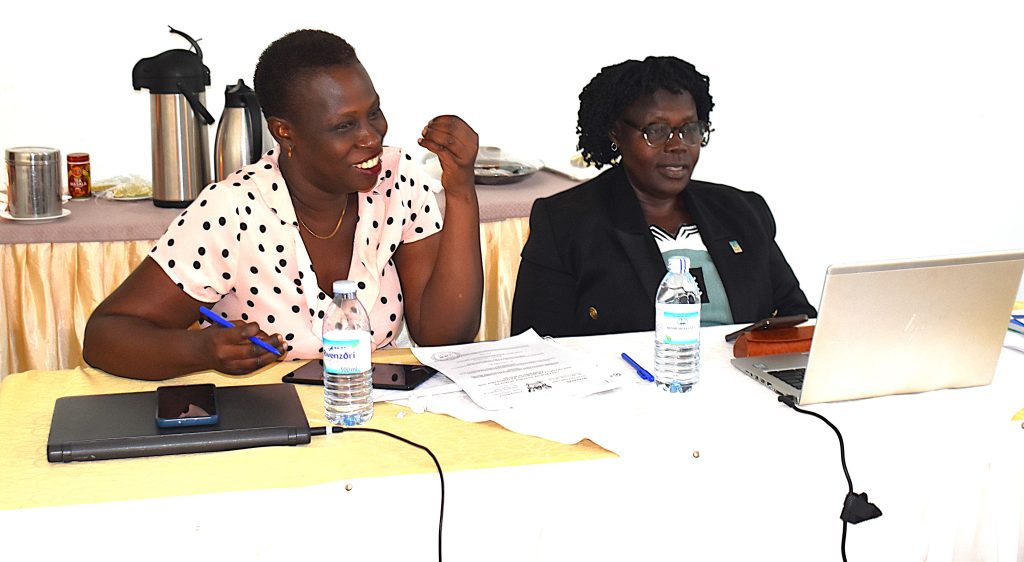
In his closing remarks, Dr. Efitre emphasized that well-trained research assistants are central to generating credible evidence that reflects the lived realities of beneficiary households. “This training is a vital investment in strengthening our MEL system and ensuring that the evidence we generate informs learning, accountability, and improved project outcomes,” he noted.

The participants expressed gratitude for the interactive and practical nature of the training, noting that the sessions significantly enhanced their confidence and readiness for fieldwork. The training concluded with a question-and-answer session and a brief assessment to confirm participants’ understanding of the MEL framework and household survey tool.

Pre-testing of the household survey tool
Following the training, the project team conducted a pre-test of the household survey tool at Kasenyi Landing Site in Entebbe on 19th January 2026, ahead of the baseline survey. The baseline data collection will be carried out across five landing sites: Katosi (Mukono District), Kikondo (Buikwe District), Bangaladesh and Kayago (Amolatar District), and Dei (Pakwach District), spanning Lakes Victoria, Kyoga, and Albert.
Details on the project at: https://news.mak.ac.ug/2025/10/mak-conas-launches-nutrifishplus-project/
Trending
-

 Humanities & Social Sciences2 days ago
Humanities & Social Sciences2 days agoMeet Najjuka Whitney, The Girl Who Missed Law and Found Her Voice
-

 Health7 days ago
Health7 days agoUganda has until 2030 to end Open Defecation as Ntaro’s PhD Examines Kabale’s Progress
-

 Agriculture & Environment5 days ago
Agriculture & Environment5 days agoUganda Martyrs Namugongo Students Turn Organic Waste into Soap in an Innovative School Project on Sustainable Waste Management
-

 General7 days ago
General7 days agoMastercard Foundation Scholars embrace and honour their rich cultural diversity
-

 Health2 weeks ago
Health2 weeks agoCall for Applications: Short Course in Molecular Diagnostics March 2026
